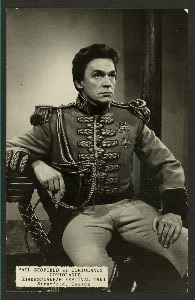Scofield
was an "actor's actor" who at his best, had
a way of portraying his characters that seemed to go
beyond stagecraft to reveal that person's very soul.
Ironically, the boy who'd been considered a "dolt" became
an actor who was most noted for the air of extraordinary
intelligence he brought to every role. Before method
acting became common, Scofield was one of the few actors
who zeroed-in on the inner life of his characters.
In a period when actors strove to be larger than life,
Scofield's performances where characterized by realism, "clarity
and unmannered intensity."20 The
Telegraph's Domenic Cavendish writes, "Blessed
with a grandeur of presence and vocal range that rivalled
that of the stars that preceded him by a generation
-- Olivier and Gielgud – he [Scofield] also introduced
a dimension of naturalism that helped theatre achieve
a more modern sensibility."21

Paul
Scofield as Coriolanus, the Stratford Shakespeare Festival,
Stratford, Ontario, 1961. The
grim look may be due to director Michael Langham's insistance
that the ugly moment in which Aufidius stands on the corpse "be
played with absolute clarity.22"
Photo:
Billy Rose Theatre Collection, New York Public Library
This
web site's links provide
ample information on Scofield's professional triumphs.
To
filmgoers he is best known
for his Oscar-winning performance as Thomas More
in A
Man For All Seasons (1966), his iconoclastic
portrayal of King Lear (1970),
and his puzzled, principled Mark Van Doren in Quiz
Show. In the theatre he was celebrated
for his portrayals of Timon of Athens, Hamlet,
the whiskey priest in The Power and the
Glory,
and Salieri in Amadeus.
He is often acclaimed as the greatest Lear of the
20th
century and possibly all time. He served as co-director
for the Royal Shakespeare Company (1966-1968) and Director
of the National Theatre (1971). His awards include
an Academy Award for Best Actor (1966), Golden
Globe Award for Best Actor – Motion Picture Drama
(1966), Primetime Emmy Award for Outstanding Lead Actor – Miniseries
or a Movie (1969), and a Tony Award for Best Performance
by a Leading Actor in a Play (1962).
Though he declined a knighthood three times, he
accepted the honours of the Order of the British
Empire and
Companion of Honour.
Later
Career
20)
Wikipedia, op cit. (top)
21) Domenic Cavendish, "Paul Scofield's Lasting Contribution
to Theatre," The Telegraph, http://www.telegraph.co.uk/news/uknews/1582306/Paul-Scofields-lasting-contribution-to-theatre.html,
accessed 27/12/09. (top)
22) John Ripley, Coriolanus on Stage in England
and America, 1609-1994, p. 300.
1998: Cranberry, NJ (top)
|
|